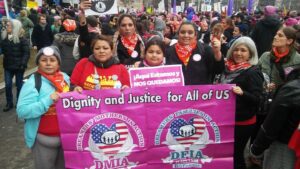
What would you be willing to do to get the attention of the most powerful people on the planet? How far would you be willing to go to stand up for your friends, family, and community? How much are you willing to risk to see justice realized for people whose lives are constantly devalued by our political systems?
In November of 2014, Lenka Mendoza of Dreamer Mothers in Action (DMIA) showed the world her answer to these questions by fasting for 18-days in the cold and the rain in front of the White House, demanding that President Obama sign an executive order providing legal status for the parents of Dreamers (undocumented migrants who entered the US as minors and who are given legal status under the Dream Act). She got the President’s attention, and she won. Temporarily. The order was blocked by the courts and ultimately rescinded by the next administration. Still, very few people in Lenka’s position can say they had the ear of the President of the United States for any length of time.
Lenka is an undocumented immigrant from Peru, and in 2014 she had been living in Virginia for 13 years, working 13-15-hour days with no holidays as a hotel domestic worker to support her family. When her two sons grew to be teenagers she realized they couldn’t attend college because of their immigration status. She saw fellow parishioners at her church ripped away from their families by the immigration system. She knew other domestic workers like herself who suffered harsh working conditions and abuses by employers. At each turn, the injustices she experienced and witnessed turned her towards activism. Her first desire was that no one else suffer the same experience.
Lenka founded DMIA (one of Virginia Organizing’s partner groups) to empower her community through collective action on the issues that directly affect their lives. By coming together to fight against injustice, community members learn that they are not alone, that they have rights, that they can have an impact, and that they don’t have to passively accept the traumas and injustices they experience. They learn through collective action that they are powerful.
Lenka says that they don’t have to win every campaign to learn this. Even when they lose, “people know they can make change and have lost a lot of their fear. It makes them stronger,” she says. “They’ve been able to participate in something bigger than themselves.”
DMIA helped win the right to drivers licenses for undocumented immigrants in Virginia, and helped end the 287(g) program in Prince William County. They have organized domestic workers to win workplace protections and pay raises while educating workers about employment law. To build the movement they teach leadership classes to ensure there are people in the community to sustain the work long-term.
The future of DMIA’s work needs to be intersectional, Lenka says. She sees that a lot of the issues her community faces overlap with other groups, issues like mental health, education, housing, and safe neighborhoods. “Black and Brown communities have been separated, but they’d be more powerful together,” she says. She hopes to build organizing partnerships with other groups because there is so much work to be done, and we all need to step up together to do it.
For Lenka, it seems like the work won’t be done anytime soon. “The minute you close one thing, another thing comes up,” she says. “It’s like a secret level that appears at the end of a video game just when you think you won!”




